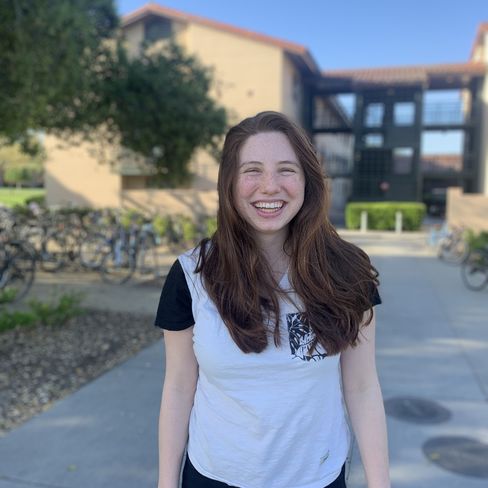Human Rights Minor Capstone
What is the Human Rights Capstone?
The human rights capstone requirement is designed to meet the unique needs and interests of students from a broad range of undergraduate majors. This requirement represents a culminating experience for students in the human rights minor and designed to expand upon interests that might come about from related academic disciplines or past research experiences.
Capstone projects have taken on different formats such as full-length research papers (25-30 pages) or creative projects in art, performance, media, or literature. Some students may wish to explore a human rights topic of their choosing in other ways, perhaps drawing on the skills they have learned in their major disciplines or prototyping a tool for practical application for a human rights problem.
To fulfill the Capstone requirement, students may choose between one of two pathways: the Independent Project Pathway or the Course Equivalency Pathway. Students must complete 3-5 units for their capstone requirement, reflecting the nature of the student’s proposal. The student must receive a grade of ‘B’ or higher to claim credit for the human rights minor. For more information please see our program bulletin.
Independent Project Pathway
• Under the supervision of an approved faculty member, students propose and complete a 3-5 unit self-designed capstone project.
Course Equivalency Pathway
• Submit a proposal to use work you will complete in an existing 3-5 unit course to fulfill the capstone requirement.
Students wishing to complete a capstone project other than a research paper may propose alternative culminating work. Click to see examples.
- Film, produce, and screen an original short documentary about a local organization or student group’s advocacy efforts around a particular human rights topic. (e.g. examining the work of local affordable housing advocates and exploring the ways in which they invoke rights-based rhetoric in pursuit of their goals)
- Develop an annotated digital database of materials related to the promotion or protection of human rights (e.g. a database of country reports and NGO “shadow reports” on core human rights treaty compliance, with tools designed to help human rights scholars, students, and advocates discover trends or draw comparisons between these documents)
- Develop a GIS mapping project that layers different types of data to discover and illustrate relationships between potentially related phenomena and/or change over time (e.g. environmental issues such as desertification, or public health issues such as disease incidence or infant mortality rates, mapped alongside data about reported instances of certain types of human rights violations)
-
Curate an art exhibit featuring works related to a particular human rights theme (e.g. artistic depictions of the refugee experience)
-
Produce a series of original podcasts exploring a human rights topic in-depth
- Compile and organize a literary anthology of fiction, non-fiction, and/or poetry that grapples with human rights themes
- Develop a software application designed to address a specific human rights challenge (e.g. a tool for aid workers in a conflict area to be able to record and store sensitive interview information or other data, even in the face of frequent loss of internet connectivity, and securely back up data to a cloud-based repository, whenever possible)
To get started on potential capstone ideas, please use our capstone brainstorm form. You will receive personalized feedback upon submission.
For more information on becoming a faculty capstone advisor, please see our brief Human Rights Capstone Faculty Guide.

A’ole TMT: Environmental Justice and Indigenous Resistance in Hawaiʻi
Lilli Carlsen, Class of 2021
Lilli Carlsen graduated with an M.A. in Environmental Communication, a B.A. in International Relations, and a minor in Human Rights. She focused her studies on intersectional environmental justice and international environmental policy.

Rights and Resistance: A Comparative Analysis of the Post-Partition Civil Rights Movements in Indian-occupied Kashmir
Muskan Shafat, Class of 2021
Muskan Shafat graduated with a B.A. in Political Science, focusing in Data, Justice, and Economic Development. She also pursued minors in Global Studies and Human Rights. Muskan was raised in the conflict-torn region of Kashmir and explored the history of her home through the Human Rights minor. Through her human rights capstone project, she researched the movements in Kashmir from 1947-present. She is passionate about the intersection of technology and policy, particularly the impact of data-driven technologies on minority populations, and hopes to keep exploring this intersection.

Investigating Patient Quality of Life in San Francisco Homeless Health Facilities: An Architectural Exploration
Janet Coleman-Belin, Class of 2019
Janet strives to individually and systematically affirm that every person is important, valuable, and loved. She graduated with a B.A in Architectural Design Engineering and minors in Human Rights and Spanish. Following a gap year of travel and internships with human rights organizations, Janet is currently pursuing her M.D. at Icahn School of Medicine at Mount Sinai through the FlexMed Program and is committed to addressing upstream social and economic determinants of health. She interned with Wadah Titian Harapan in Indonesia, performed legal observations with Al Otro Lado in Tijuana, and is tremendously grateful to the Center for Human Rights and International Justice Center team for exposing her to thought-provoking courses, inspiring individuals, and compassionate guidance.

Quantifying Refugee and Migrant Portrayals in Literature and Media
Andrew Quirk, Class of 2019
Andrew Quirk graduated with a B.S. in Computer Science and a minor in Human Rights. At Stanford, he worked on multiple projects combining computer science and machine learning with humanitarian causes. As a Center for Human Rights and International Justice summer fellow, he traveled to Cape Town, South Africa his junior year and worked at the Scalabrini Refugee Center applying his software engineering skills. As a senior, he founded a political engagement startup and completed his senior capstone analyzing rhetoric around refugees with Natural Language Processing techniques.

Human Rights and History Podcast Series
Alina Utrata, Class of 2017
Alina Utrata graduated with a B.A. in History and a minor in Human Rights. As a history major, Alina focused her undergraduate studies on understanding how legal mechanisms, like international courts, impact communities emerging from conflict. She spent summers interning at the Balkan Institute for Conflict Resolution, Responsibility, and Reconciliation in Sarajevo, and trial monitoring for the Center for Human Rights and International Justice (formerly WSD Handa Center) at the Khmer Rouge Tribunal in Phnom Penh. She is particularly interested in how legal mechanisms, like international courts, impact communities emerging from conflict and her undergraduate honors thesis "Stories Courts Tell" focused on the impact of the Yugoslav Tribunal on Bosnia and Herzegovina. She has worked at the Balkan Institute for Conflict Resolution, Responsibility, and Reconciliation in Sarajevo, Bosnia, and Herzegovina; the State Department’s International Narcotics and Law Enforcement Bureau in Washington DC; International trial monitoring team in Phnom Penh, Cambodia; and was a Student Assistant for the Center for Human Rights and International Justice. She is a 2017 Marshall Scholar at Queen's University Belfast in the Conflict Transformation and Social Justice Master's Program.